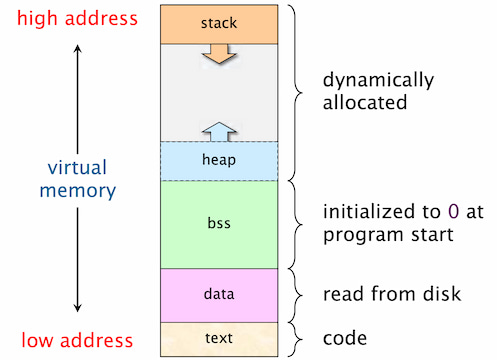Sahithyan's S2 — Program Construction
C Basics
Memory management
Memory is allocated either implicitly (variable declaration) or explicitly
(malloc()) and deallocated either implicitly (by the compiler) or explicitly
(free())
Memory layout in C is similar to the image below.

- text - readonly. stores compiled machine code. fixed size, determined at compile time.
- data - initialized variables. stores global and static variables. readable & writable. fixed size, determined at compile time.
- bss - short for block started by symbol. uninitialized variables. stores global and static variables that are uninitialized or initialized to 0. fixed size, determined at compile time. automatically initialized to 0 by OS.
- heap and stack grows in the opposite directions
- heap can have gaps but stack cannot
Undefined Behavior
A behavior which is specified as unpredictable in the language specification in which a program is written.
There are a lot of cases for undefined behavior in C.
- Usage of a deallocated (using
freeorrealloc) pointer - The pointer argument to
freeorreallocdoesn’t match a pointer earlier returned bycalloc,mallocorrealloc. - The pointer argument to
freeorreallocwhich is already deallocated usingfreeorrealloc - A non-null pointer pointing to zero requested size is used to access an object
String
A string is an array of char. They are null terminated using the null
character (or \0 or NUL). The null character is added automatically to the
end of the array by the compiler.